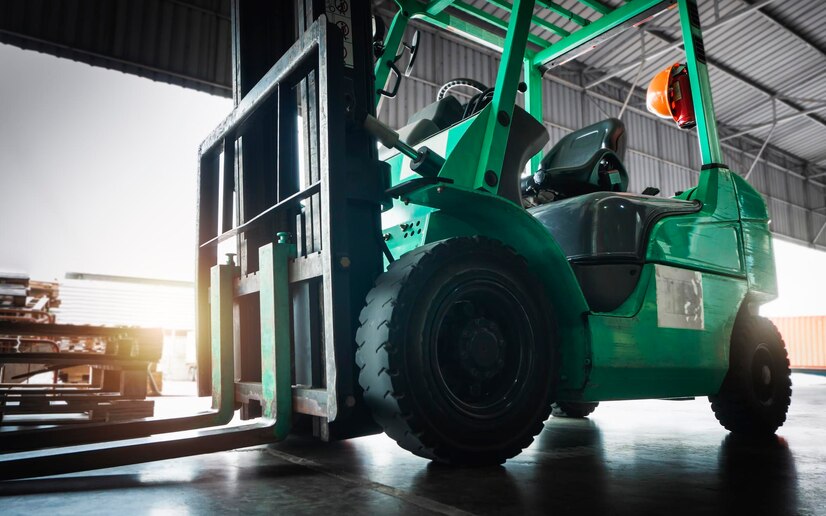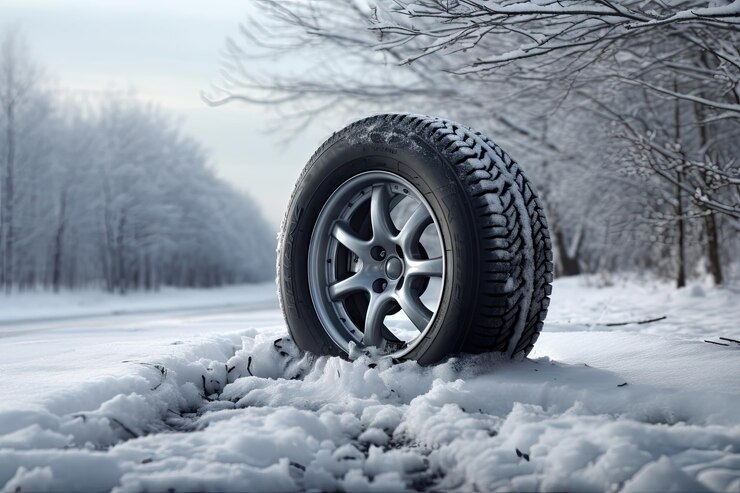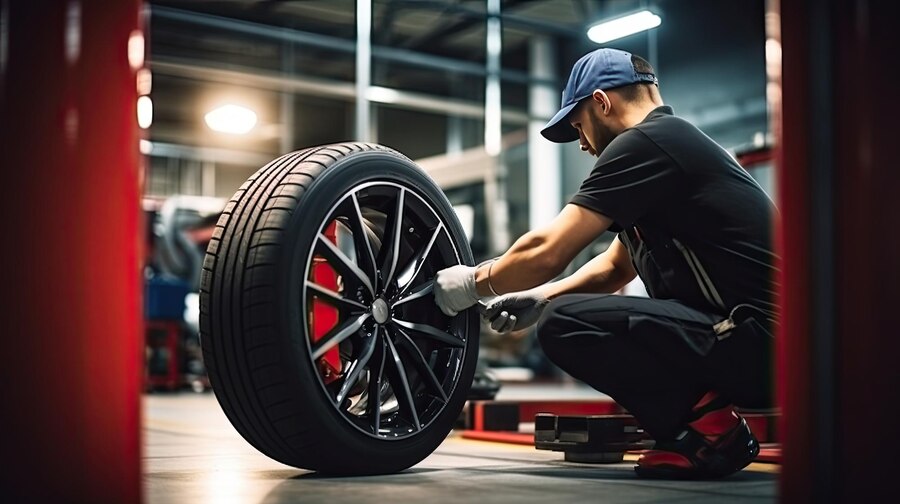A Guide To Forklift Tyres And Maintenance
Why Do You Need Special Forklift Tyres?
Forklifts play a crucial role in many industries. From warehouses to construction sites. But you must have wondered.
Why do different forklifts need different types of tyres?
The answer lies in the unique terrain they drive on. Not all tyres can meet all needs.
To ensure your forklift fleet operates at its best, you need the right tyres that can handle various terrains and conditions. This is especially true for outdoor operations where unpredictable weather and terrain can affect performance.
Some warehouses may require specific forklift tyre types based on their location or the materials they handle. The size of the tyre should be chosen based on the load each wheel carries.
In general, selecting a tyre that supports the load with the lowest inflation pressure is a wise choice.
8 Types of Forklift Tyres
Type 1: Pneumatic Tyres─ Versatile and Cushioned
Pneumatic forklift tyres come in various forms. Including, solid, air-filled, foam-filled, or non-marking white pneumatic tyres.
These forklift wheels are somewhat similar to car tyres. They require air, an inner tube, and a tyre flap to keep the air or other filling securely trapped.
They are ideal for larger forklift machinery. It offers cushioning and stability for long shifts in both indoor and outdoor environments.
Type 2: Solid Rubber Tyres─ Durable and Puncture-Resistant
Solid forklift tyres are made of solid, robust rubber. This makes them ideal for rough work conditions. As they’re prone to sharp floor debris that may puncture traditional tyres.
Hence, these industrial tyres are perfect for outdoor landscapes with scattered debris. Such as recycling facilities or machine shops.
However, due to their solid nature, they’re not suitable for uneven terrain.
Type 3: Cushion Tyres─ Smooth Surface Specialists
Cushion forklift tyres are designed for indoor use on smooth surfaces. They are cost-effective and are often used with electric and internal combustion forklifts for light lifting duties.
These tyres do not require compressed air but utilize specialized equipment to press the rubber directly onto the wheel. They come in various options to suit different forklift applications.
Type 4: Polyurethane Tyres ─ Chemical Resistant
Polyurethane forklift tyres tend to outlast pneumatic or cushion tyres. They are ideal for indoor warehouse environments with clean surface flooring.
While they lack deep treads and cushioning, they excel in chemical resistance. Hence, making them perfect for facilities prone to chemical seepage or spills.
Type 5: Non-Marking Tyres ─ Floor-Friendly
Non-marking tyres are specially designed to prevent black marks on floors. Industries like grocery stores and food processing facilities require them.
However, these tyres have a shorter lifespan due to the removal of carbon black from the rubber compound.
Type 6: Puncture-Proof Tyres ─ Durable + Low Maintenance
These tyres are the most common choice today. While not air-filled, they are puncture-proof and long-lasting. Hence, making them suitable for indoor and light outdoor use.
However, they may not provide enough cushioning for rough outdoor or uneven surfaces.
Type 7: Off-Road Tyres ─ Rugged + Puncture-Resistant
Off-road tyres are ideal for outdoor operations in rough terrains where paving is impractical.
They have large, knobby tyres for excellent grip and high puncture resistance. Hence, commonly seen on side loaders at logging mills.
Type 8: Foam Fill Tyres ─ Puncture Prevention
Foam-fill solid tyres are filled with a special resin that provides constant forklift tyre pressure while preventing punctures.
These forklift tyres offer cushioning like air-filled tyres without the risk of getting punctures.
Pros & Cons of Forklift Tyres
| Type of Forklift Tyres | Pros | Cons |
| Solid Forklift Tyres | Puncture resistant | Ergonomically hard on operator |
| Suitable for outdoor terrain | Terrain obstacle difficulties | |
| Pneumatic Forklift Tyres | Very versatile | Not puncture resistant |
| Suitable for various terrains | Longer repair time | |
| Cushion Forklift Tyres | Ideal for indoor use | Tyre may tear |
| Longer service lifespan | Difficult instant repair | |
Polyurethane Forklift Tyres
| Versatile on smooth surfaces | Hard on operator |
| Offers longevity | Vulnerable to punctures |
Special Forklift Tyres | Needed For Unique Operations
While most forklifts operate in distribution and warehouse settings. Specialized conditions require unique tyre options:
- Fibreglass Tyres: Ideal for heat-sensitive environments, these tyres have higher heat resistance compared to rubber.
- Anti-static Tyres: Suitable for volatile industries handling combustible materials, they produce virtually no static discharge.
- Walnut Cold-Prepped Winter Tyres: These tyres provide better traction on icy surfaces, making them perfect for freezer applications and icy grounds.
3 Key Qualities for Picking Forklift Tyres
- Style: Choose tyres that match your specific needs and the surface they will be used on.
- Tread: Decide whether you need tyres with tread for better traction or smooth-surfaced tyres for indoor use.
- Size: Ensure the tyre size matches the load distribution to prevent overloading and tyre damage.
When should you change your forklift tyres?
Forklift tyre replacement intervals depend on the forklift’s specific operating conditions and intensity.
The Pit Stop Line tyre shows when it needs changing by displaying a bright orange band through the black tread, signalling around 100 hours of service life left.
Signs of Compromised Tyre Lifespan
- Forklift Tyres beyond 50% wear line.
- Chunking (pieces falling off the tyre).
- Tearing (repeated wear in specific spots).
- Flat areas (indicating wear pattern issues).
Forklift Tyre Maintenance
Neglecting forklift tyres and maintenance can cause problems beyond repair.
1. Check Air Pressure Regularly
Ensure your tyre air pressure is always at the correct level. Factors like extended use can increase forklift tyre pressure. Keep caps and valves covered; avoid lowering air pressure as it can generate heat.
2. Avoid High-Impact Movements
Refrain from sudden braking, excessive cornering, locking a wheel for tight turns, or abrupt starting movements. These high-impact actions can wear out your tyres quickly.
3. Proper Storage
Store tyres in a cool, dark, and oil-free area. Keep them away from active electric engines. Try not to store tyres for extended periods, as rubber can deteriorate over time.
4. Reduce Wear and Tear
Keeping your forklift tyres in good shape helps reduce wear and tear. Hence, lessening stress on the transmission and the forklift driver.
5. Improve Fuel Efficiency
Proper tyre maintenance significantly enhances fuel efficiency and overall safety.
Final Words
In conclusion, choosing the right forklift tyres is essential for optimal performance on different terrains. Regular maintenance and timely forklift tyre replacement are equally important.
No need to scroll endlessly to find the best ‘forklift tyres near me’ shops.
Contact Wangara Tyres and Autos for expert tyre advice. Explore a wide range of forklift tyres for sale to meet your specific needs.
Buy Best Forklift Tyres Perth
Your forklifts deserve the best tyres. We are here to make it happen.
For all your forklift tyre needs. Contact Wangara Tyres and Autos today!
Let us help you find the perfect tyres for your forklift fleet.




